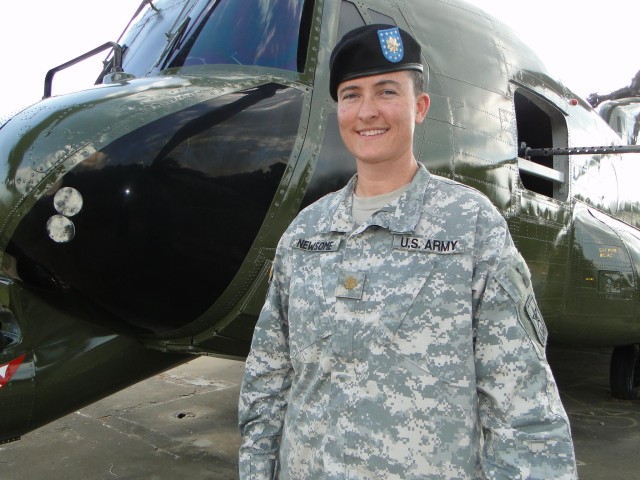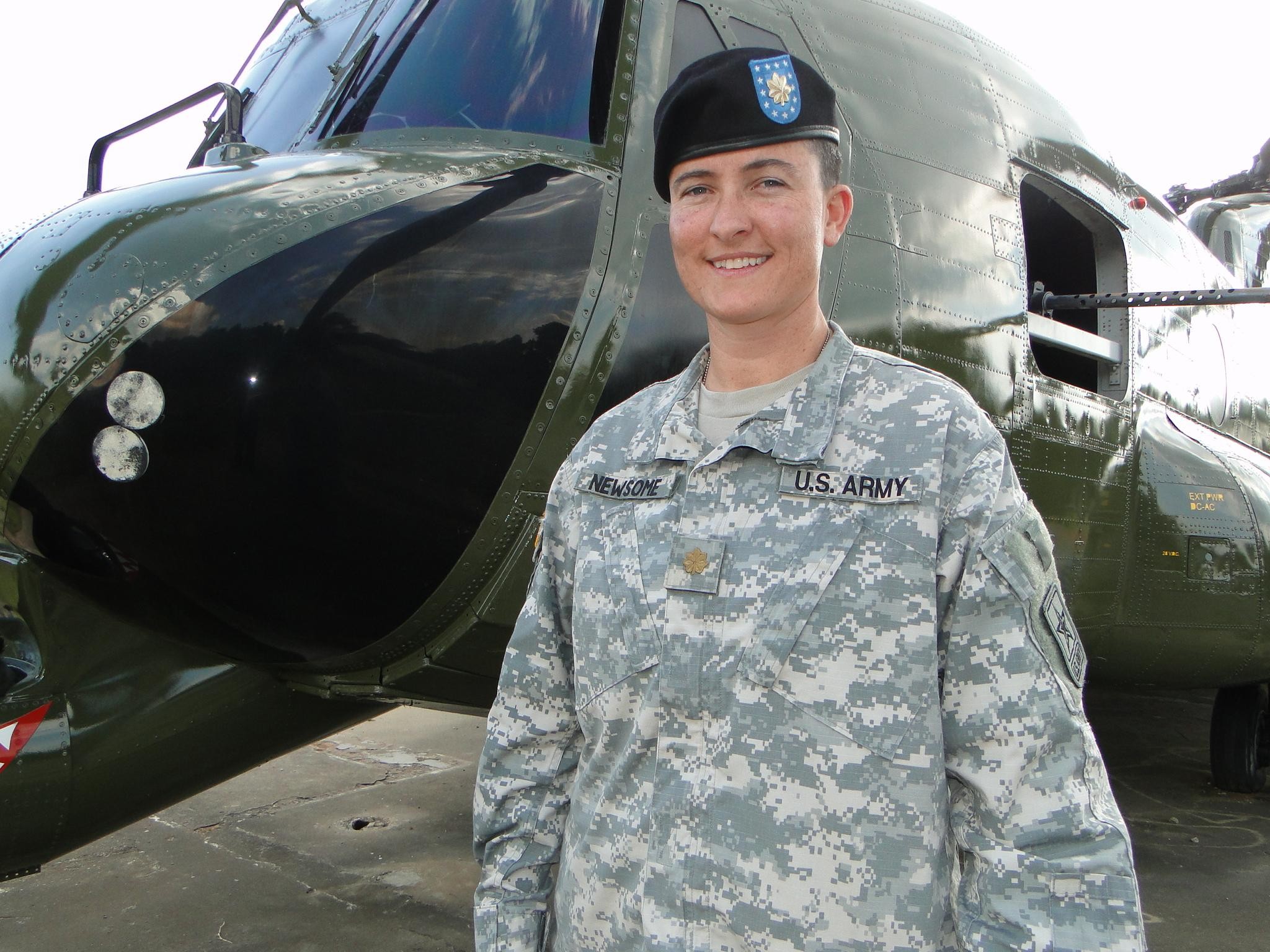
Maj. Jennifer Newsome has spent much of her Army career flying Chinook helicopters.
But these days her career has taken a turn into acquisition, where she works in the Cargo Helicopter Project Office for the Program Executive Office of Aviation. Since February 2008, she has served as the assistant product manager for the CH-47F Improved Cargo Helicopter, a remanufactured version of the CH-47 Delta cargo helicopter.
Although no longer flying full-time, Newsome will always be among the first female helicopter pilots to fly in a war environment during two deployments in Operation Iraqi Freedom. With 11 years in the Army, Newsome is continuing to spread her professional wings as she takes on new responsibilities that will impact the Army's aviation fleet for years to come. The bottom line for her, as with many who are in Army leadership positions, is to make a difference for Soldiers and to continue in that mission for several more years.
"This is my second family," she said. "That's a feeling. The Army came around at one point when I was a captain asking what they could do to keep us in the Army. I told them 'You can't do anything. It's the troops. It's the war fighters. It's not the incentives. It's not the money for sure. It's the troops as a whole. That's my family.'
"I love aircraft. I love flying. But the reason I stay in the Army is the troops."
When she visits her hometown, longtime friends often question why she is still in the Army. Many comment that they thought she would be instead pursuing a career as a commercial pilot.
"My answer to them is 'I never knew how much in love I would fall with the Soldiers and the mission. It's something in my heart. It's not just a job,'" she said.
The demanding life of an Army aviator has presented challenges for Newsome. But they have been challenges she has faced successfully thanks to her determination, commitment, sense of purpose and Army training.
"There have been hard times. There have been cumbersome times," she said. "But this has never felt like a job. This has always felt like something I was meant to do. I always remember wanting to fly."
Newsome grew up in Cocoa, Fla., near Kennedy Space Center, Cape Canaveral and Patrick Air Force Base. Her family included Air Force and Navy veterans. But when it came time to choose a career, it was the Army that offered her the best chance at being an aviator.
"In high school, I was the class president, and tops in academics and sports. There were lots of college scholarship opportunities available to me, but none of them offered anything about aviation," Newsome said. "My counselor suggested the military and I was actually sort of surprised by what they had to offer. I had not done JROTC in high school, but I did see ROTC in college as a way to actually fly."
After graduating from Florida Tech, Newsome was among a small percentage of newly commissioned officers selected for aviation.
"It was a pretty intense selection process. But in the end, I went to flight school at Fort Rucker (Ala.) in 1998," she said. "I was the second in my class and because of that I got to select my aircraft type. I chose the CH-47 Delta. I thought if I could fly that big one that would be great."
Newsome thrived on the training at Fort Rucker.
"To be honest, I loved it. It was exciting. I had a whole different concept of what the real Army was," she said. "I really, really enjoyed it. And when I was asked to go to Korea, I jumped at the opportunity."
Her first assignment as a Chinook helicopter pilot took Newsome to Camp Humphreys, Korea, where she put in a lot of flight hours in "Bambi bucket" operations to dose forest fires with water, troop and cargo hauling missions, and practicing evacuation missions.
"There was a lot of neat flying over there. It was really cool," she said. "While I was there, I was also under the command of my first and only female battalion commander - Col. Theresa Barton."
In 2000-02, Newsome was assigned to Hunter Army Airfield at Fort Stewart in Savannah, Ga., where she took the captain's career course and aviation maintenance course.
"I had orders for Fort Campbell (Ky.). But I was barely there when we rallied troops and headed for Iraq," she recalled. "One of the most exciting things for me was crossing the berm into Iraq with the 101st."
Newsome first flew CH-47 Delta helicopters in Iraq with the 8th Battalion (Aviation Intermediate Maintenance), 101st Aviation Division, 101st Airborne in 2003-04. She returned to Iraq in 2005-06 as commander of Charlie Co., 1st of the 58th Aviation. Both units were out of Fort Campbell.
"It was good stuff. I have no complaints," she said.
The austere living conditions of that first deployment to Iraq did not deter Newsome. Often, she was the only woman among Soldiers, and she commanded an all-male Soldier unit.
"There wasn't anything in the way of living supplies," she said of those early days in Iraq. "The logistics supply lines were cut off and things got to us at a very, very slow pace. We had water to drink. But we had to use baby wipes for personal hygiene. We had no facilities to live in. We lived in tents, and bombed out hangars and shelters. Soldiers would find stuff and they would make a home. While we were there, our deployment was extended from six months to a year.
"But it was wonderful over there. It was a very rewarding experience for me, even though it was very dissolute. It was probably one of the best times I've had in the Army. It challenged everything I'd been taught. We didn't have the tactics, techniques and procedures of fighting a war in Iraq. We were writing them as we went along."
Her second deployment was marked by better resources and living conditions.
"Everything you do over there is obviously more cumbersome," she said. "But we worked as a team. If the Soldiers know you are there to take care of them, they are going to make sure to take care of you. Soldiers have a lot of respect for each other, regardless of whether they are male or female."
During her two deployments, Newsome had plenty of opportunity to fly Chinooks.
"I participated in a multitude of missions over there," she said. "There were troop hauling and equipment hauling missions. I led the guys who did the maintenance for the 8th Battalion. And I had a tower mission with the Air Traffic Services."
While she was skilled in flying helicopters and leading troops, Newsome has a lot of appreciation for the maintenance crews who keep helicopters in the air.
"They would never let anything fall through the cracks. They all took a personal pride in the work they did," Newsome said of her maintenance crew. "Aircraft repair is almost like an art. The majority of the guys absolutely love what they do and that makes a world of difference."
She has also learned what it takes to manage and motivate Soldiers, skills that she is honing as she works with a civilian team in the business environment at Redstone Arsenal.
"Whenever I got new Soldiers in, I would brief them, and during that briefing I would say to them 'Do you like your job' Because, honestly, I want you to like your job,'" she recalled. "It is so much easier to work in an environment where people around you are enjoying their job. If they wanted to be cross trained to try something else, I would work that out. It wasn't just their skills that were important to the team. They, as individuals, were important to the team, too."
Newsome considers it an honor to work with the Army's work force and equipment. She said the Army is in the people business, and that each member of the work force is part of an integral team.
Newsome is excited about the capabilities the CH-47F brings to the Army's helicopter fleet. Its new 4,868-horsepower engines reach speeds greater than 175 mph and transport payloads weighing more than 21,000 pounds, its monolithic structure lessens vibration and maintenance while increasing productivity, and its digital architecture allows it to communicate with the Army's digital battlefield network.
The CH-47F extends the life expectancy of Chinook helicopters another 20 years, giving the original CH-47 aircraft a total life of 60 years. The CH-47F continues the Chinook's mission of providing support, coverage and sustainment of maneuver, fire support, air defense, and mobility and survivability mission areas as it transports ground forces, supplies and battle critical cargo.
"The beginning of the life cycle process for the CH-47F was in 1998," Newsome said. "The first F model was fielded in the summer of 2007 with the 7th Battalion (of the 101st Aviation Regiment) at Fort Campbell."
So far, 59 CH-47Fs, which are tan in color, have been fielded with the 7th Battalion; 4th Infantry Division at Fort Hood, Texas; 1st Cavalry at Fort Hood, Texas; and the 82nd Airborne and Cab Combat Aviation Brigade at Fort Bragg, N.C. The fifth unit - the 6th Battalion of the 101st Aviation Regiment at Fort Campbell -- should be equipped with the F model by December.
"The F model has flown in both the Iraq and Afghanistan theaters," Newsome said.
Newsome enjoys the challenge of working on the CH-47F model, and interfacing with engineering, contracting, operations, testing and other business elements. She hopes to eventually be assigned to work in Washington, D.C., for ASA(ALT), the Assistant Secretary of the Army (Acquisition, Logistics and Technology), and to continue on a career path that will take her into a program management job as a colonel at Redstone Arsenal.
Though hardware is her focus these days, Newsome said she is motivated by making a difference for Soldiers and the future Army.
"Being with the Soldiers is what's kept me in the Army," Newsome said. "When I've not been flying, the troops are some of the most phenomenal people you'll ever meet. In my career, I want to go where I'm most effective for the Army and where the Army wants me to go. The Army demands you have certain milestones in your life and career, and you need to be successful in every milestone. I wouldn't change anything about my career with the Army. I would do it all over again tomorrow."

Social Sharing